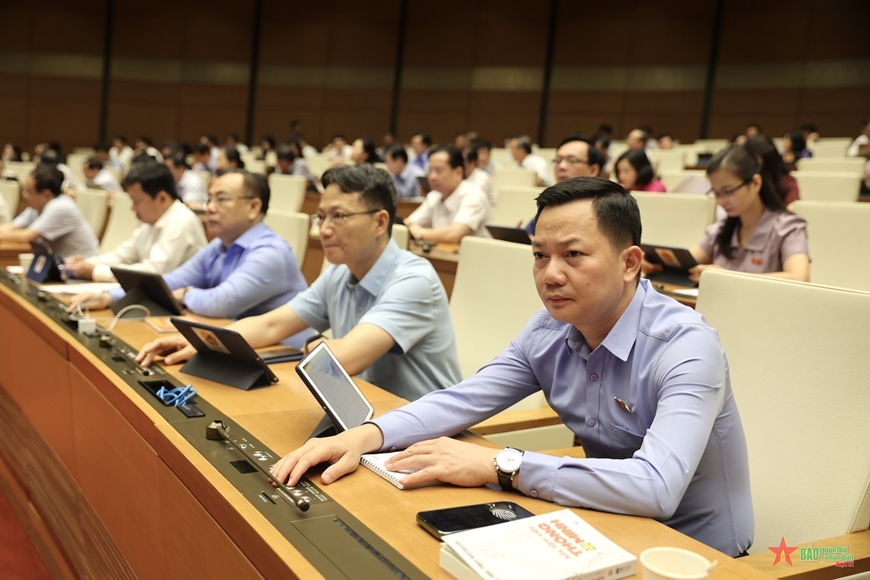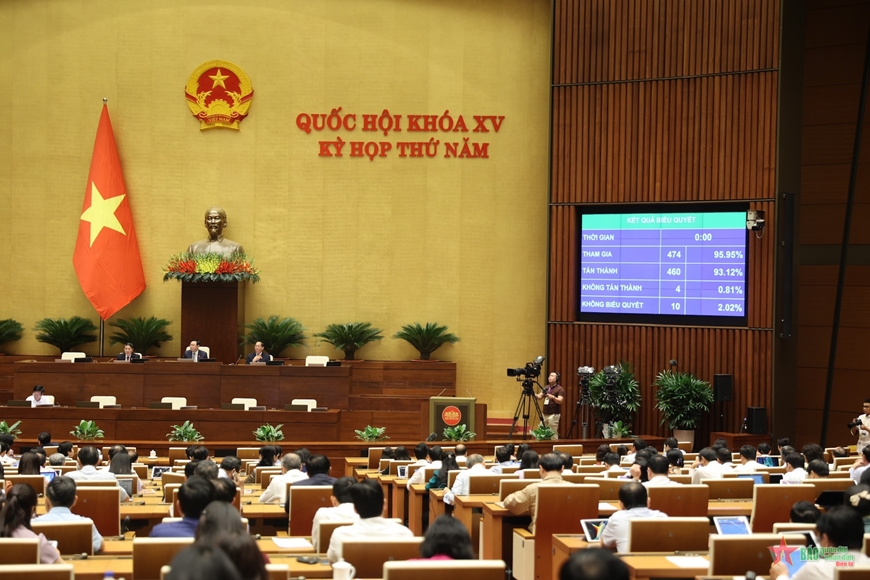On the morning of June 23, with the majority of National Assembly deputies in favor (93.12% of the total number of deputies), the National Assembly voted to pass the Law on Bidding (amended).
The Law on Bidding (amended) stipulates state management of bidding activities; the authority and responsibility of agencies, organizations and individuals in bidding activities, activities of selecting contractors to implement bidding packages, activities of selecting investors to implement business investment projects.
No provisions for contractor selection in special cases
Regarding the scope of application of the Law on Bidding to state-owned enterprises and projects using state capital, according to the provisions of the law, the scope of regulation includes: Bidding packages belonging to investment projects of state-owned enterprises according to the provisions of the Law on Enterprises and enterprises in which state-owned enterprises hold 100% of charter capital. This provision ensures harmony between the requirement to improve the effectiveness of state management and the autonomy of enterprises, without narrowing or expanding the scope of subjects excessively. On the one hand, it ensures that bidding brings economic benefits to the inviting party, on the other hand, it ensures the building of a healthy, competitive, equal, public and transparent investment and business environment.
 |
National Assembly deputies voted to pass the Law on Bidding (amended) on the morning of June 23. Photo: TUAN HUY |
The Law on Bidding (amended) does not regulate the selection of contractors in special cases. According to the Standing Committee of the National Assembly, the current Land Law and the draft Land Law being amended do not regulate bidding to select investors applicable to investment projects related to national defense and security, so the regulation on investors in special cases is not consistent with the draft of the Land Law. In addition, this content has many factors that do not ensure transparency, are unclear about the process and procedures, and pose a potential risk of policy exploitation, especially for investment projects using land for commercial purposes; moreover, there has been no precedent for applying this mechanism to date.
Regarding the regulations on centralized bidding, purchasing drugs, chemicals, and medical equipment, the National Assembly Standing Committee has directed the agency in charge of reviewing and the agency in charge of drafting to closely coordinate with relevant agencies and a number of National Assembly deputies working in the health sector to review and unify the terminology used in the law. Unify regulations on centralized procurement for purchasing rare drugs and drugs that need to be purchased in small quantities. Review regulations on selecting contractors to supply chemicals and medical equipment. The law also adds regulations on payment from the health insurance fund in cases where private medical examination and treatment facilities do not choose to apply the provisions of the Bidding Law. Amend regulations on medical examination and treatment facilities being allowed to decide on their own procurement on the basis of ensuring publicity, transparency, economic efficiency, and accountability.
Reduce the number of cases of direct contracting
The Law on Bidding (amended) has also been reviewed and adjusted to reduce some cases of designated bidding. In addition, it has added regulations on some special cases that have been stipulated in Decision No. 17/2019 of the Prime Minister to apply designated bidding.
 |
| View of the National Assembly session on the morning of June 23. Photo: TUAN HUY |
Regarding the opinion that the bidding should be expanded beyond the cases as prescribed, it is recommended to implement the method of bidding with reduced prices because there are cases that bring higher efficiency, according to the Standing Committee of the National Assembly, if the application of bidding is increased, in some cases it may lead to a situation of "asking-giving", reducing competition. Contractors who are not familiar with the investor will not have the opportunity to participate in the bidding, small businesses will have difficulty competing. In addition, online bidding is currently being promoted with simple procedures, saving time, so expanding bidding is unnecessary.
The significance of bidding activities in recent years has been, on the one hand, to benefit the inviting party, in order to select contractors who compete in price and good quality; on the other hand, bidding aims to ensure publicity, transparency, and create a fair and healthy competitive environment. Therefore, the Law on Bidding (amended) does not expand the cases of designated bidding.
The Law also specifically stipulates the powers and responsibilities of the Government, the Prime Minister, the Ministry of Planning and Investment, and stipulates the responsibility for state management of bidding. The Law takes effect from January 1, 2024.
MANH HUNG
Source


































































































Comment (0)